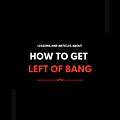“Left of Boom” - A Review
There are two things that I will always support: people who serve and support our nation’s service-members through their actions, and efforts to deny our enemies the ability to launch attacks against our country. Former CIA case officer Doug Laux is, without a doubt, one of those people, and his book, Left of Boom, is absolutely one of those efforts. I’ll be honest and admit that I only first looked into the book out of curiosity after receiving four or five emails last week from people letting me know about a new book that was published with a title very similar to mine. But after reading the book’s subtitle, How a Young CIA Officer Penetrated the Taliban and Al Qaeda, and Amazon’s book description, I not only picked it up, but became so engrossed in the story that I read it from cover to cover in a single sitting.
Left of Boom is the personal story written by Douglas Laux, one of the book’s authors and the CIA case officer who was able to infiltrate the Taliban, and his co-author Ralph Pezzullo. To provide a point of reference for our readers, while Left of Bang talks about how we can use enhanced situational awareness and behavioral analysis to identify people with violent intent as they move through the attack cycle, in Left of Boom, the authors tell the story about how Laux worked to understand the networks reaching back into Pakistan that supplied Taliban fighters in Afghanistan with IEDs, and in turn was able to help our service-members move to a point even earlier on the bang/boom timeline.
As with many books written by former CIA officers, there is the inherent excitement in reading about Laux’s initial training and deployment, yet this book is balanced by the sacrifices that come with decisions to serve. From the loss of friends and connections to a period of alcohol and drug abuse to cope with the struggles of returning home, the book traces the highs and lows from Laux’s time in service. Because of that, Left of Boom is absolutely a book that deserves a spot on the bookshelves of American warriors.
One of the things that leads to me say that this book is such a good read is that it is candid and to the point. As someone who is committed to his mission of protecting American troops, Laux discusses in Left of Boom how willingly suspended his ego to deal with greedy lowlifes who would have happily sold him out to the Taliban if they had offered to pay as much as he was offering them. But what he often found himself most frustrated at was having to push back against the tidal wave of inertia that characterizes bureaucratic processes, and he doesn’t pull any punches. If you are like me and enjoy a healthy dose of contempt for risk-averse government officials who happen to be more concerned about their own careers than making actual progress against our enemies, then you will certainly not be disappointed.
While some of the other reviews that I read of the book commented negatively on the fact that it is a highly redacted account of Doug Laux’s service in the CIA, don’t let that influence your decision to buy and read Left of Boom. Even though the CIA censors did what they are tasked to do, most of the redactions don’t impact your understanding of what is actually happening. For instance, the “foreign country” he alludes to is Pakistan, even though it is blacked out in every case. The same goes for Pakistan’s intelligence service, the ISI, which is also blacked out. There is one section of the book where Laux describes how he paid a Pakistani man who ran some sort of delivery service in exchange for information. While the city and the product that he delivered were redacted, you could substitute in any product for what is blacked out and not lose even a shred of the overall story.
While I was initially attracted to the book because of its title, and immediately connected with the author, as we were both freshmen in college on September 11th and were both driven to service by the attacks, Left of Boom is a book that I found a great deal of value in. I ended up reading the book a second time so that I could consolidate my notes about what I learned from his infiltration of the Taliban’s IED network, which I’ll pass along in an article next week, as they are worth an article of their own. For our nation’s protectors who are not just looking to contain our enemies, but to truly defeat them, the experiences and stories offered in Left of Boom are well worth the price of the book.


